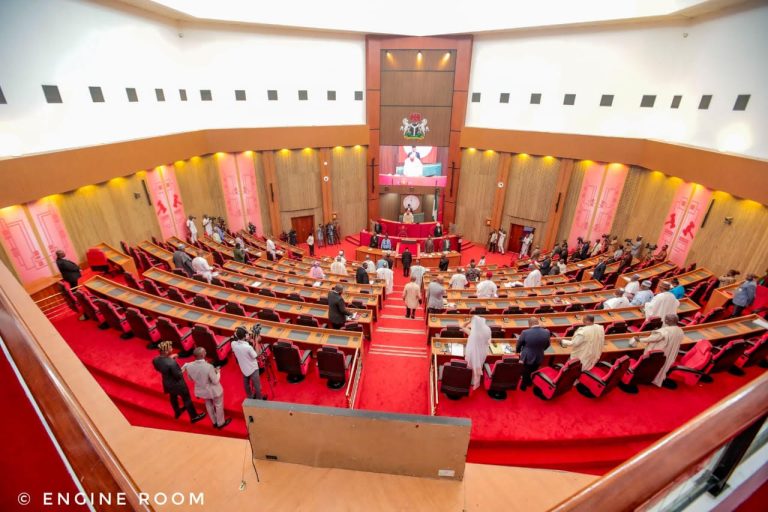From Abuja, Kenneth, Udeh
The fiercely debated Tax Reform Bills forwarded to the National Assembly by President Tinubu in October 2024 passed the second reading in the Senate on Thursday.
The bills scaled through after lawmakers debated both in favour of and against their passage. They were subsequently referred to the Committee on Finance, chaired by Senator Sani Musa (APC, Niger East), with a mandate to organise public hearings involving stakeholders such as the Governors’ Forum, National Economic Council (NEC), and Northern Elders’ Forum (NEF) and report back within six weeks.
Before debating the bills, the lawmakers, presided over by Senate President Godswill Akpabio, held a closed-door session lasting about an hour.
Upon returning, Senate Leader Opeyemi Bamidele (APC, Ekiti Central) introduced the bills, which were listed under his name.
The four bills passed by the Senate include:
- The Nigeria Tax Bill 2024, expected to provide a fiscal framework for taxation in the country.
- The Tax Administration Bill, which will provide a legal framework for all taxes in the country and reduce disputes.
- The Nigeria Revenue Service Establishment Bill, which will repeal the Federal Inland Revenue Service (FIRS) Act and establish the Nigeria Revenue Service.
- The Joint Revenue Board Establishment Bill, which will create a tax tribunal and a tax ombudsman.
To convince his colleagues to support the bills, Bamidele, in his lead debate, outlined their benefits, including a reduction in corporate taxes from 30% to 25%.
Bamidele explained that the bills seek to eliminate the current practice where the Federal Government takes a lion’s share of Value Added Tax (VAT) revenues. Instead, state governments will share 55% of VAT revenue under the new formula, an increase from the current 15%, while local governments’ share remains unchanged.
To address the tax burden on poor Nigerians, Bamidele added that the bills propose a more progressive Personal Income Tax (PIT) system, with reduced rates for low-income earners. For instance, those earning under ₦800,000 annually would pay no PIT.
Similarly, VAT would be removed from basic consumables such as food, medical services, housing, pharmaceuticals, educational fees, and electricity.
Bamidele also highlighted the introduction of the “Principle of Derivation,” which would abolish the current VAT revenue-sharing formula favouring states hosting the headquarters of goods and service providers rather than those where the goods and services are consumed.
He explained: “The current arrangement, unlike what is proposed, unduly favours the most industrialised states in Nigeria to the detriment of states where such goods and services are consumed but do not host the headquarters of these service and goods suppliers.”
Senators who spoke in favour of the bills included Sani Musa (APC, Niger East), Seriake Dickson (PDP, Bayelsa West), and Tahir Monguno (APC, Borno North).
However, Senator Ali Ndume (APC, Borno South) opposed the bills, calling for their withdrawal.
Sani Musa, who chairs the Senate Committee on Finance, lauded the bills’ initiatives. While acknowledging objections raised against them, he assured that all relevant stakeholders would be involved during the public hearings.
“This bill is coming at a time when Nigeria needs reform in its economy, and as a committee (Finance), we shall discharge our responsibilities in the best interest of Nigerians,” Musa said.
Senator Seriake Dickson supported the bills, noting that they would entrench fiscal federalism in Nigeria. However, he expressed reservations about the transparency of the proposed redistribution of revenues and called for the taxation of oil workers to benefit local governments hosting oil rigs rather than the headquarters of oil companies.
Dickson remarked: “In the early days of Nigeria, taxes were placed on cows. But when oil was discovered in the Niger Delta, they found free money and abandoned taxation.”
Opposing the bills, Senator Ndume argued that certain proposals, such as the derivation principle and VAT revenue redistribution, required constitutional amendments. He also criticised the reduction of corporate taxes, saying it could be unfair to manufacturers with lower profits.
Ndume said: “This bill should be withdrawn. We need to consult more and secure the buy-in of governors, traditional rulers, and the NEC before presenting it for a final decision.”
When Senate President Godswill Akpabio put the passage of the bills to a voice vote, the majority of lawmakers shouted “Aye,” prompting Akpabio to strike the gavel in favour of the “Ayes.”
